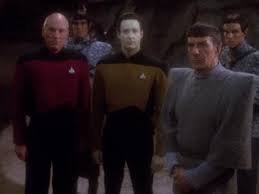TOP FIVE FRIDAY: STAR TREK's Most Unconventional Diplomatic Solutions

Star Trek has always pushed the boundaries of science fiction, not just through its depiction of futuristic technology but also through its innovative approaches to diplomacy and conflict resolution. Captains and crews across various Starfleet vessels have often had to resort to unexpected tactics to navigate the treacherous waters of interstellar politics. Here's a countdown of the top five most unconventional diplomatic solutions in the Star Trek universe.
5. "Counterpoint" - Star Trek: Voyager
Captain Kathryn Janeway's blend of sharp wit and diplomatic guile shines in the episode "Counterpoint." As Voyager passes through Devore space, Janeway must outmaneuver the Devore inspector, Kashyk, who is determined to find and deport telepathic refugees hidden aboard her ship. Janeway engages in a risky game of deception, feigning romantic interest in Kashyk to keep him off-balance. Her ability to flip the script on an oppressive regime without firing a single shot lands this episode in our top five.
4. "In the Pale Moonlight" - Star Trek: Deep Space Nine
Captain Benjamin Sisko faces a moral quandary in one of Deep Space Nine's darkest episodes. To bring the Romulans into the Dominion War and save the Federation, Sisko conspires with Elim Garak to fabricate evidence that the Dominion plans to attack the Romulan Empire. This episode explores the murky depths of wartime ethics and the costs of peace, with Sisko ultimately deciding that the ends justify the means—a decidedly un-Starfleet-like conclusion that secures its spot on our list.
3. "Unification" - Star Trek: The Next Generation
In this two-part episode, Spock ventures covertly to Romulus with a mission to reunify the long-estranged Vulcan and Romulan peoples. His approach is as unconventional as it is bold—using underground, grassroots diplomacy rather than official channels. Spock engages with the Romulan populace, hoping to ignite a movement based on shared heritage and peace. Although his initial plan doesn’t unfold as expected, Spock's efforts lay the groundwork for future dialogues between the two species. His commitment to peace through personal diplomacy and the fostering of mutual understanding highlights a theme central to the Star Trek ethos—the belief in the transformative power of reaching out, even in the face of great personal risk.
2. "Darmok" - Star Trek: The Next Generation
Captain Jean-Luc Picard finds himself linguistically marooned on a planet with the Tamarian captain, Dathon. The Tamarians communicate solely through metaphor, a method initially impenetrable to the Universal Translator. Picard’s eventual understanding of this language, culminating in his recounting the story of Gilgamesh and Enkidu to Dathon, bridges the communication gap and forges a bond through shared narrative. This creative resolution underscores the power of empathy and mutual understanding.
1. "The Measure of a Man" - Star Trek: The Next Generation
In what is perhaps the pinnacle of Star Trek’s exploration of morality and personhood, Picard must use all of his diplomatic skills to argue that his android officer, Data, is a sentient being with rights of his own in a Starfleet courtroom. Instead of resorting to conventional legal tactics as a lawyer would do, Picard challenges the very notions of consciousness and self-awareness, turning the trial into a profound inquiry into what it means to be alive. This episode not only resolves a dispute but also sets a precedent in the ethical treatment of artificial life forms.
Chris Post is a life-long fan of Star Trek who has been working in journalism for nearly 25 years.










